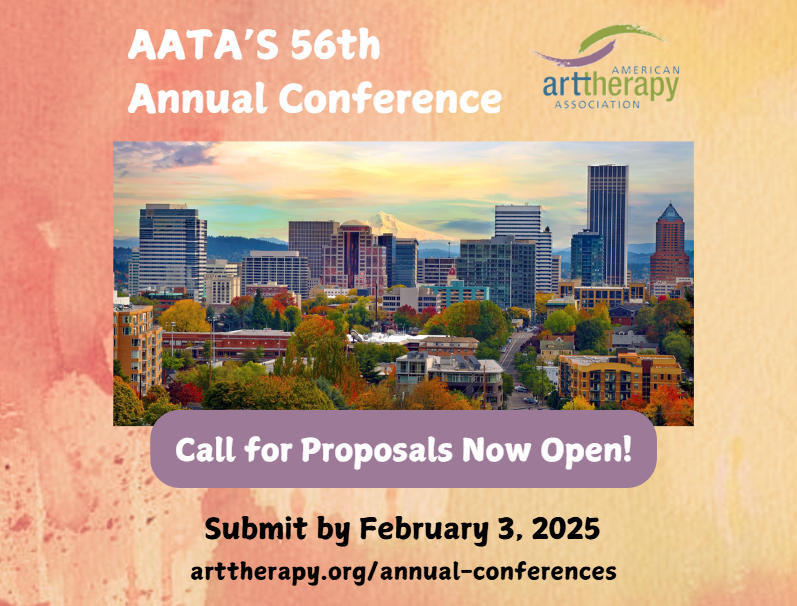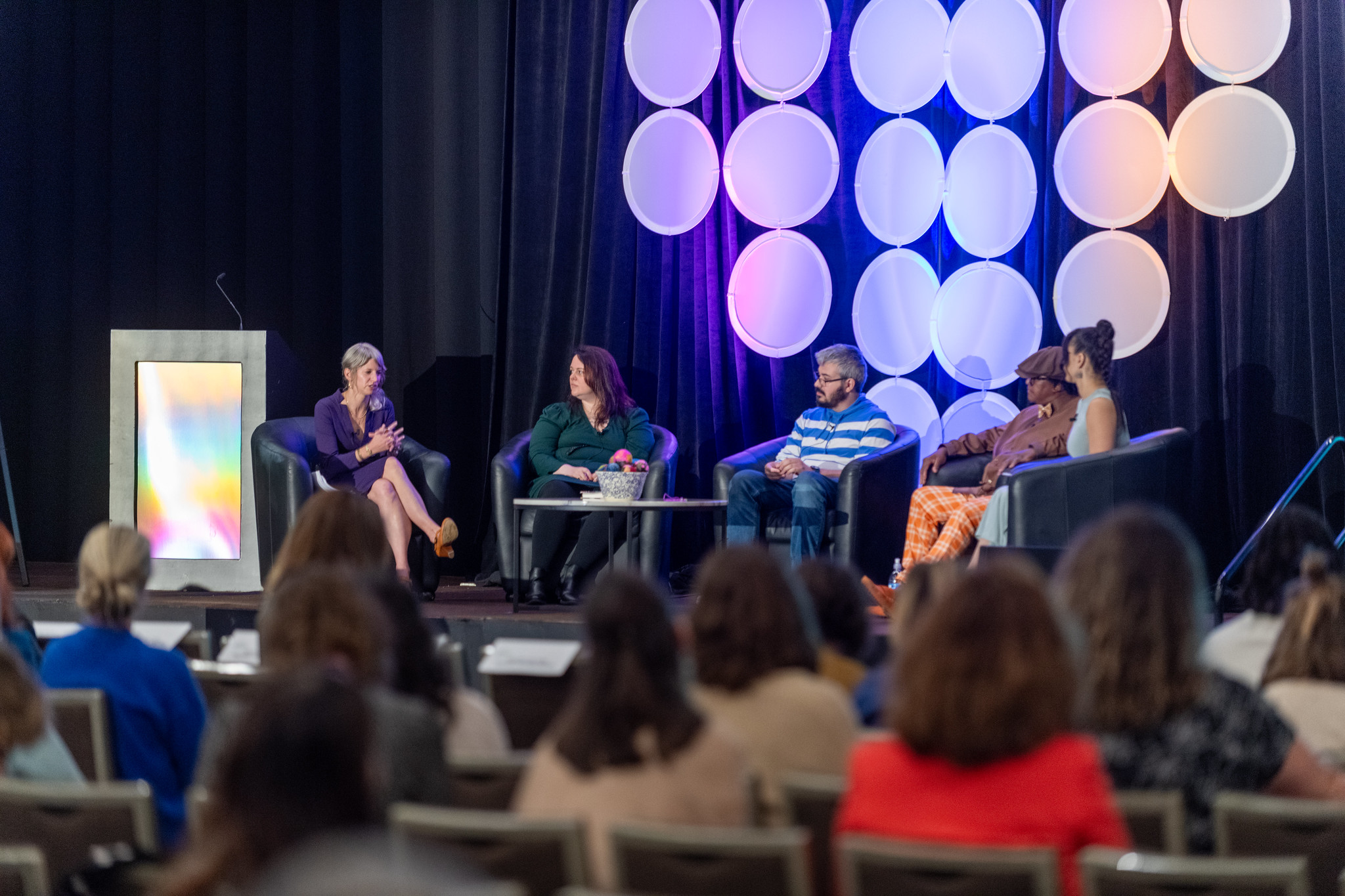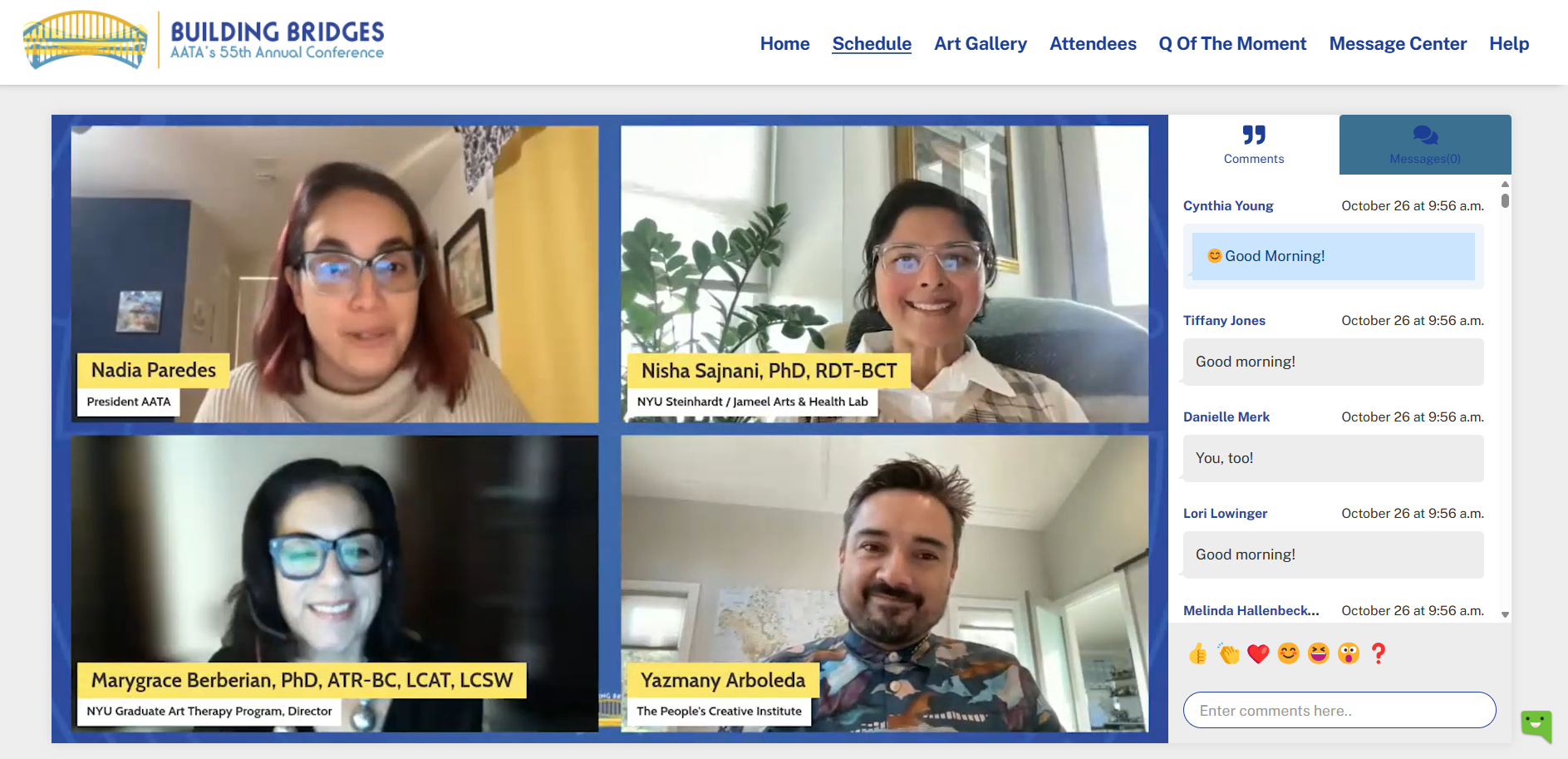December 11, 2024
We are excited to announce AATA’s 2025 Call for Proposals and share with you some information about the proposal process.
This year, AATA’s Call for Proposals invites submissions for two event opportunities:
- AATA2025, the in-person conference scheduled for Oct. 8 – 11 in Portland, Oregon
- A two-day live virtual conference, tentatively planned for Fall 2025

Whether you’re considering our in-person conference in Portland, Oregon (October 8-11) or our Virtual Conference, now’s the time to start brainstorming and drafting your ideas. You don’t have to be an AATA member to apply, but proposals must feature at least one presenter with a master’s degree or higher in art therapy or a related mental health field.
You are welcome to make more than one submission but please note that all presenters are limited to 3 submissions, including being identified as a co-author.
Need Help Getting Started? These Tools can Help!
- Learn how to craft the perfect proposal in this video from President Nadia Paredes and Past-Conference Committee Chair Dr. Carolyn Brown Treadon
- Read the Conference Committee’s 9 Tips for Submitting a Successful Proposal.
- Review our 2025 Call for Proposals Guide for details on the submission process, presentation options, and continuing education standards.
Presenting at an AATA conference is an excellent opportunity for you to fine-tune your research, polish your presentation skills, and add to your resume, all while advancing the art therapy profession. Don’t miss out on these opportunities to share your share your expertise with the art therapy community, submit by February 3 at 11:59 pm ET to be considered.
AATA2025, the Annual In-Person Conference

AATA’s 56th Annual Conference will be held October 8 – 11, 2025, at the Hilton Portland Downtown in Portland, Oregon. The theme of the conference is Ascending to New Heights. We expect close to 1000 attendees at this conference, making this conference the largest gathering of art therapists, students, and researchers of the year.
The in-person conference offers presenters the most options as to the format of their presentation. Presenters may select from these formats:
Full-Day and Half-Day Advanced Practice Courses: These are three or seven-hour educational sessions with limited seating that aim to teach participants a new technique through experiential learning. Art supplies are provided by AATA.
Workshops: 1.5 hour educational sessions with limited seating and an “experiential” component to gain hands-on experience and mastery over the material covered. Art supplies are provided by AATA.
Papers: 50-minute lecture-style educational sessions in which up to 3 presenters share information using a PowerPoint presentation
Panels: 1.5 hour conversational or discussion-based presentations that have between 3-5 presenters
Performance Art: 50-minute educational session in which presenters share information on professional issues or clinical applications in art therapy through performance art modalities, including drama, music, poetry, text, movement, or visual art
Posters: 60-minute sessions in which the presenters are invited to a room to share their research on a poster with attendees who are welcome to walk freely around the room and hear about as many research topics by students as they’d like. Students and professionals are invited to submit poster proposals.
Video: 50-minute finished video on topics related to professional issues and/or clinical practice.
Two-Day Virtual Conference
AATA is planning a 2-day Virtual Conference, tentatively scheduled for Saturday October 25 and Sunday October 26 of 2025. The Virtual Conference will be hosted live on a custom-built virtual conference platform and recorded for viewing in AATA’s Online Learning Academy.

The conference will be comprised of sessions in the following formats:
Panel: A 1.5 hour educational session featuring 3–5 presenters, including a moderator and a PowerPoint. The panelists engage in an open discussion with one another throughout the presentation to supplement the information included in their slides, with time allocated for audience questions.
Paper: A 50 minute lecture-style presentation featuring up to 3 presenters and a PowerPoint with time allocated for audience questions.
Please note, virtual conference sessions are not intended to include experiential activities.
Program Tracks for All Submission Opportunities
Both submission opportunities will be organized into nine main subject tracks to help participants find areas of interest. Each proposal submitter must select one subject track to best describe their session.
Clinical Approaches
Proposals that present information on therapeutic best practices, case studies, and art therapy techniques and methods, including Addictions/Substance Abuse (AS), Geriatrics (GE) Psychiatric Settings (PS), Child/Adolescents (CA), Medical Settings (MS), School Settings (SS), and Forensics (FS).
Contemporary Issues/Current Trends
Proposals that present information in one of the following areas of interest: Activism (AC), Grief/Mourning (GM), Autism (AU), Professional Practice (PP), Trauma (TR), and Ethics (ET).
Diversity, Equity, and Inclusion (DEI)
Proposals within this category, grounded in the DEI activist movement, explore studies in art therapy assessments, current research, and theoretical models.
Education & Supervision (ES)
Proposals that present information on updates in art therapy training and education and the latest teaching methods. Or focus on supervision techniques and educational developments.
Multicultural Perspectives (MP)
Proposals in this category distinctly highlight the impact of diverse cultural backgrounds on art therapy practices.
Research/Evaluation (RE)
Proposals that present the theory and practice of clinical evaluation, the use of standardized assessments, systematic case studies, outcome studies, and all forms of inquiry, using or exploring various research methodologies.
Studio & Community (SC)
Proposals that present an art studio-based approach and how artist-centered art therapy practice and community outreach programs are designed to improve our collective well-being.
Technology & Innovation (TI)
Proposals that showcase advancements in technology, cutting-edge research, and innovative models in the field of technology.
Theory & Assessment (TA)
Proposals that present studies in art therapy assessments, current research, and theoretical models which should be presented by experienced researchers.
